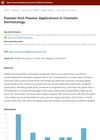 1 citations,
January 1980 in “Archives of Dermatology”
1 citations,
January 1980 in “Archives of Dermatology” Syphilis chancres can be atypical, and fiber implantation for baldness is risky and often fails.
1 citations,
August 1976 in “Veterinary clinics of North America” Cats often lose hair due to self-injury, usually from flea allergies.
 December 2024 in “Dermatological Reviews”
December 2024 in “Dermatological Reviews” New treatments for Alopecia Areata, like JAK inhibitors, are effective, and future research is exploring advanced therapies.
 October 2024 in “Biology”
October 2024 in “Biology” Dermal papilla cells can help regrow hair and are promising for hair loss treatments.
 October 2024 in “Bangladesh Journal of Botany”
October 2024 in “Bangladesh Journal of Botany” Figleaf gourd is more resistant to cinnamic acid stress than cucumber.
 August 2024 in “Journal Integration of Social Studies and Business Development”
August 2024 in “Journal Integration of Social Studies and Business Development” Sassle's haircare business is financially viable and profitable.
 March 2024 in “Cleveland Clinic journal of medicine”
March 2024 in “Cleveland Clinic journal of medicine” Alpha-blockers and 5-alpha reductase inhibitors are main treatments for BPH, with new support for phosphodiesterase-5 inhibitors and beta-3 agonists.
 February 2024 in “Practical Diabetes”
February 2024 in “Practical Diabetes” Spironolactone helps reduce hospital visits and death from heart issues, lowers blood pressure, but has unclear effects on heart failure with normal heart pump function and can cause high potassium and breast enlargement in men.
 January 2024 in “Brazilian Journal of Hair Health”
January 2024 in “Brazilian Journal of Hair Health” Some plant-based products might treat hair loss with fewer side effects than current medications.
 January 2024 in “Journal of cutaneous and aesthetic surgery”
January 2024 in “Journal of cutaneous and aesthetic surgery” Scalp injuries and harsh hair care can cause severe hair matting in children.
 January 2024 in “Women's health science journal”
January 2024 in “Women's health science journal” Hormonal imbalances are a key cause of missed menstrual periods in women.
January 2024 in “Biomaterials Research” The new 3D system helps test hair growth treatments effectively.
 December 2023 in “bioRxiv (Cold Spring Harbor Laboratory)”
December 2023 in “bioRxiv (Cold Spring Harbor Laboratory)” AP-2α and AP-2β proteins are essential for healthy adult skin and hair.
 August 2023 in “JAAD international”
August 2023 in “JAAD international” Pediatric dermatologists have varied preferences for treating alopecia areata in children, with no standard FDA-approved treatments and some using JAK inhibitors despite risks.

Scalp tonics are popular for stress-related hair loss, but minoxidil is used less due to side effects and inconvenience.
 June 2023 in “Asian Journal of Pharmaceutical Research”
June 2023 in “Asian Journal of Pharmaceutical Research” Different types of hair loss require specific treatments, and new treatments are being developed.
 May 2023 in “JAAD international”
May 2023 in “JAAD international” Minoxidil-dutasteride tattooing can potentially help regrow hair, especially in men who already have some thin hair.
 May 2023 in “Elsevier eBooks”
May 2023 in “Elsevier eBooks” Scarring alopecia causes permanent hair loss, and treatment aims to reduce inflammation and stop it from getting worse.
 April 2023 in “The journal of investigative dermatology/Journal of investigative dermatology”
April 2023 in “The journal of investigative dermatology/Journal of investigative dermatology” The protein p21 is more abundant in normal skin cells than in melanoma cells and may help protect against melanoma, with UVB light affecting its levels.

Baricitinib is a new, effective treatment for advanced alopecia areata but is costly and has risks.
 December 2022 in “Cureus”
December 2022 in “Cureus” Hormones significantly influence hair growth, with conditions like hirsutism and patterned hair loss linked to hormone levels; more research is needed for full understanding.
 December 2022 in “IntechOpen eBooks”
December 2022 in “IntechOpen eBooks” Testosterone is important for male development and health, and careful replacement can treat low levels.
 November 2022 in “Journal of Investigative Dermatology”
November 2022 in “Journal of Investigative Dermatology” The research found specific genes that are more active in balding cells, which could be causing hair loss.
 October 2022 in “Portuguese journal of dermatology and venereology”
October 2022 in “Portuguese journal of dermatology and venereology” The best concentration of triamcinolone acetonide for treating alopecia areata is still unclear.
 September 2022 in “Open Access Macedonian Journal of Medical Sciences”
September 2022 in “Open Access Macedonian Journal of Medical Sciences” Platelet-rich plasma helps in skin healing, scar repair, and may boost hair growth in alopecia.
January 2022 in “Springer eBooks” Fibroblast growth factors are crucial for hair follicle development and regeneration.

The document is about planning a review to assess if PRP alone is effective for treating hair loss in men and women.
 June 2021 in “CRC Press eBooks”
June 2021 in “CRC Press eBooks” Plant-based hair care products can effectively treat hair loss with fewer side effects than synthetic treatments, and more research is needed for their development.
 June 2021 in “Journal of The American Academy of Dermatology”
June 2021 in “Journal of The American Academy of Dermatology” The "spade sign" is a highly specific indicator for diagnosing acne keloidalis.
 June 2020 in “IP Indian journal of clinical and experimental dermatology”
June 2020 in “IP Indian journal of clinical and experimental dermatology” Older people more commonly have skin conditions related to aging, and early treatment can improve their quality of life.



























